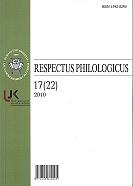АДРЕСАНТ КАК ALTER EGO АДРЕСАТА
THE ADDRESSER AS AN ALTER EGO OF THE ADDRESSEE
Author(s): Lara N. SineljnikovaSubject(s): Language and Literature Studies
Published by: Vilniaus Universiteto Leidykla
Keywords: масс-медийный текст (дискурс)1; адресант2; адресат3; обратная связь4; диалогичность5 аксиологическая лингвистика6;
Summary/Abstract: The article reviews the specificity of the addresser-addressee relations in the modern mass media discourse, which is determined by the main illo¬cutive aim of this kind of language behaviour – to influence the addressee. Offering their own view on one or another state of affairs, the addresser tends to present it in a form and using methods which favour the solidarity with the addressee through common speech and intelligence processes. The perlocutionary effect planned by the addresser is connected with the cultural, psychological, and social characteristics of the addressee, with their language consciousness and their language picture of the world, the consequence of which is the ac¬tivation of the cognitive and linguistic actions of a dialogic nature from the side of the addressee. The means of the speech actions compatibility cultivated by the addresser create a communicative sphere of confidentiality, while public communica¬tion is transformed into an interpersonal one. The evolution of language is also the evolution of com¬munication forms, which goes on in the direction of more advantageous alternatives. One of such alternatives is the activation of the ‘addresser’s factor’. The aim to cooperate with the addresser by using the ‘signals’ of their language picture of the world shifts the idea about the language culture types: elite, middle literary, and literary informal ones. These types are synthesized in the mass media discourse. At the same time the addresser tends to break the identity of their language personality for the benefit of the addressee’s language personal¬ity. A tendency to form the integrated (addresser-addressee) language personality is disclosed. Mass media texts aiming to ‘extend’ the addressee create an effect of communication reality and show the live sphere of language functioning. Changes in the field of norm are stored, first of all those of the stylistic norm. At the same time, a complete identification with the consciousness of the target addressee is fraught with the danger of an irre¬versible deviation from the traditional norms of public speech.
Journal: Respectus Philologicus
- Issue Year: 2010
- Issue No: 17 (22)
- Page Range: 26-42
- Page Count: 17
- Language: Russian

